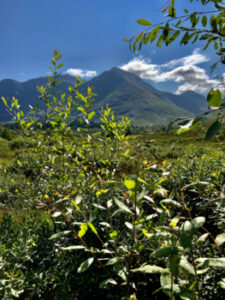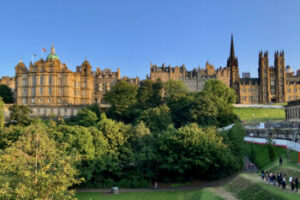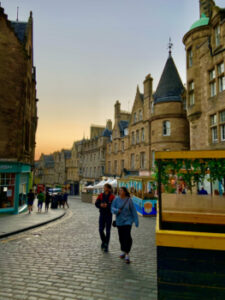MARY, MARY, QUITE CONTRARY
Mary, Mary, quite contrary,
How does your garden grow?
With silver bells and cockle shells,
And pretty maids all in a row.
 Her impotent rage boiled as she heard that awful rhyme float up from the lawn below, chanted by a group of children waiting for a school bus. If she, Mary Stuart, Queen of Scots, still were on the throne, she’d have all their heads lopped off, even if they were children. Especially if they were children.
Her impotent rage boiled as she heard that awful rhyme float up from the lawn below, chanted by a group of children waiting for a school bus. If she, Mary Stuart, Queen of Scots, still were on the throne, she’d have all their heads lopped off, even if they were children. Especially if they were children.
She looked out at the watery morning, the misty rain in the early light, and wondered what it would be like to play golf again, a distraction from the vile children below her window in Holyrood Palace where she had been for over 400 years. She’d play if she could hold a club since nothing had stopped her before. After all, the day she helped murder Lord Darnley, her pesky second husband, she had played golf and it was raining torrents that day. To be appropriate though, she had worn black.
She lifted her head off her neck, set it on the vanity and braided the hair, wrapped the braids into a swept up coil and replaced her head on her neck. The jagged marks of the three axe hacks it took to remove the cranium were still visible, but the scar of humiliation was worse. The incompetent executioner had picked up the head by the hair, which was a wig, and the head had thudded to the floor and rolled some distance, to the horror of the crowd and the outrage of Mary. So spiteful was she, that her spirit had made all of the executioner’s children look like pigs.
 Mary’s execution had stemmed from one tiny, insignificant indiscretion, namely, the liquidation of Lord Darnley, the father of her insolent pipsqueak son James. The incident had not gone well. Out of jealousy Darnley had murdered Mary’s secretary, David Rizzio, without her permission, so she’d sworn revenge against him and had ordered Lord Bothwell, her lover at the time and soon-to-be husband, to blow Darnley’s residence to dust with gunpowder. Sadly, Darnley survived the explosion so Bothwell had to smother Darnley in the garden. Messy business, that was. She married Bothwell too soon after that and the squeamish nobles had revolted over the scandal. Murder, more murder, and affairs were, she guessed, too much for the dainty nobility. Because of Bothwell’s botched butchery of Darnley and her involvement in the incident, she had been replaced on the Scottish throne by her whiny, mewling one year old son, James. Irritating, ungrateful child, she thought. Should have drowned him in the river with the kittens. Thank the heavens she only had to spend the first month of his life with him. She understood why some animals ate their young.
Mary’s execution had stemmed from one tiny, insignificant indiscretion, namely, the liquidation of Lord Darnley, the father of her insolent pipsqueak son James. The incident had not gone well. Out of jealousy Darnley had murdered Mary’s secretary, David Rizzio, without her permission, so she’d sworn revenge against him and had ordered Lord Bothwell, her lover at the time and soon-to-be husband, to blow Darnley’s residence to dust with gunpowder. Sadly, Darnley survived the explosion so Bothwell had to smother Darnley in the garden. Messy business, that was. She married Bothwell too soon after that and the squeamish nobles had revolted over the scandal. Murder, more murder, and affairs were, she guessed, too much for the dainty nobility. Because of Bothwell’s botched butchery of Darnley and her involvement in the incident, she had been replaced on the Scottish throne by her whiny, mewling one year old son, James. Irritating, ungrateful child, she thought. Should have drowned him in the river with the kittens. Thank the heavens she only had to spend the first month of his life with him. She understood why some animals ate their young.
The rain had stopped and she gazed across the Scottish countryside, the brilliant slants of sunlight illuminating the jade and kelly green of the hills. The low mountains looked like giant, puffy, moss-covered muffins, with patches of bluish purple as the silver and pewter clouds scudded overhead. From the third floor of the Palace at the foot of the Royal Mile in Edinburgh, she could clearly see the mass of Edinburgh Castle, one mile to the west, perched high on the cusp of the remnants of a volcano, and the old town, that clung to the downward angle of the crater’s edge, and ended at the palace below.
 The Castle, massive-shouldered, rough and formidable, was the symbol of Scottish history, the icon of the nation. It commanded the bay and the valleys, and still had the enormous shiny black cannons of Mary’s day, the late 1500s, pointed out to sea. The chapels, the great vaulted dining hall with a stone fireplace a man could stand up in, even the tiny chamber where she gave birth to James, were all up there, she reminisced. She looked at the Royal Mile lined with the creamy stone structures from the 17th and 18th centuries, built in elegant Georgian style with large mullioned, rectangular windows, fluted columns and grand entrances. Built 200 years after she had been queen, they spilled from the sides of the avenue to the valley below and nuzzled against the hillside.
The Castle, massive-shouldered, rough and formidable, was the symbol of Scottish history, the icon of the nation. It commanded the bay and the valleys, and still had the enormous shiny black cannons of Mary’s day, the late 1500s, pointed out to sea. The chapels, the great vaulted dining hall with a stone fireplace a man could stand up in, even the tiny chamber where she gave birth to James, were all up there, she reminisced. She looked at the Royal Mile lined with the creamy stone structures from the 17th and 18th centuries, built in elegant Georgian style with large mullioned, rectangular windows, fluted columns and grand entrances. Built 200 years after she had been queen, they spilled from the sides of the avenue to the valley below and nuzzled against the hillside.
From below she could hear fragments of conversation about something called ‘Brexit’ and calls for Scottish independence but she had not followed the news in a couple of centuries. Her place and self importance in World and Scottish history were secure, she knew, which gave her great comfort. But in the next instant, her musings were shattered.
‘You wench!! You thieving, conniving, traitorous slut!’, boomed a voice through the stone wall as an apparition oozed into her view and became Bothwell, her last husband. He moved forward, hands raised as if to strangle her, but the two figures passed through one another harmlessly, which quite embarrassed him. ‘Damn!’, he said, as he looked down at his insubstantial body.
 ‘You’ll get used to it,‘ said Mary sarcastically. ‘So why are you here, you dobber? Your prison was the perfect place to work on your book, Gun Powder for Dummies’. After the murder, Bothwell had fled England but was imprisoned in Denmark, and by the end of his life was as mad as a March hare.
‘You’ll get used to it,‘ said Mary sarcastically. ‘So why are you here, you dobber? Your prison was the perfect place to work on your book, Gun Powder for Dummies’. After the murder, Bothwell had fled England but was imprisoned in Denmark, and by the end of his life was as mad as a March hare.
‘You, Bothwell, were the putrefaction of the problem. You couldn’t kill a cockroach without a committee,’ Mary chided. He came at her again but was suddenly arrested by the view of the landscape out the window. He stopped in mid float to stare at the breathtaking town and countryside, a wonder he had not seen in 400 years. Mary and Bothwell stood side by side for the moment in mutually acceptable loathing, Edinburgh and Scotland spread out before them.
‘I miss the old town of 1560,’ she whined, ‘the haggis washed down with a pint of scotch, the bagpipes on the lawn and the kilts on the young men.’
 ‘Tell me, Trollop of the Town,’ asked Bothwell, ‘what do you miss the most? The ramshackle, tumbledown, oily huts of the stinking peasants, the horseshit, the dead in the street, the reek of damp peat smoke hanging thick as cake layers and mixed with the foul frothy fog? Look at the town today,’ he said. ‘It is a gleaming, glowing, spire-filled metropolis of cafes, museums and elegant shops on a bay of sparkling beauty,’ he said, sweeping his arm across the window. ‘It is filled with leafy squares, broad avenues, and the pulse of life.’
‘Tell me, Trollop of the Town,’ asked Bothwell, ‘what do you miss the most? The ramshackle, tumbledown, oily huts of the stinking peasants, the horseshit, the dead in the street, the reek of damp peat smoke hanging thick as cake layers and mixed with the foul frothy fog? Look at the town today,’ he said. ‘It is a gleaming, glowing, spire-filled metropolis of cafes, museums and elegant shops on a bay of sparkling beauty,’ he said, sweeping his arm across the window. ‘It is filled with leafy squares, broad avenues, and the pulse of life.’
Mary turned on him and spat, ‘Why must you ruin every good rant of mine?’, and regally tossed her head, which dropped suddenly to the table.
Silently Mary had to admit that Edinburgh was miserable in 1560, though the countryside was magic. She imagined it still was. “This Brigadoon beauty, this lone and fragile landscape, this stark and solitary transfiguration of soul, this Scotland,” she quoted from some forgotten poet. She loved the fjord-like lakes, the hills of the Trossachs and the lochs in the West, the muddling brooks, the gorse and thistle carpeting the fields and hollows, the aroma of cherry blossoms and heather and cloveroot, the purple and pewter clouds, mists like veils and an enveloping silence.
 ‘Those days in the country were idyllic, you know, before Queen Elizabeth locked you up for treason then ordered your head chopped off.’, Bothwell said smiling with pleasure. ‘And then the executioner dropped your silly head!’, as he floated into the chandelier, and howled with laughter.
‘Those days in the country were idyllic, you know, before Queen Elizabeth locked you up for treason then ordered your head chopped off.’, Bothwell said smiling with pleasure. ‘And then the executioner dropped your silly head!’, as he floated into the chandelier, and howled with laughter.
Mary replaced her head and dismissed the remark, ‘Tut, tut. So I tried to start a civil war and steal the throne of England from her. Minor matter. And then that skank Elizabeth made my son king of England and unified the nations! Outrageous! Should have been me,’ she whined shrilly. ‘My subjects adored me then and adore me now.’
‘Adored you?!‘, Bothwell said with a grimace. ‘They spat at you after you paraded past them, they pissed in the street behind you, they made up horrible rhymes, like ‘Mary, Mary…….’.
But she cut him off with a shriek of outrage and humiliation, ‘NO, NO! I won’t hear it!’, she wailed, covered her ears and sang a ditty to drown out the poem.
‘Face it, Harlot of the Highlands,’ Bothwell continued, ‘we’re both just footnotes of Scottish history. Compared to the Celts, Hadrian’s Wall, the Vikings, ‘Braveheart’, the wars and union with England, we’re just an entertaining side show, if that. We’re the hapless stars of a Jerry Springer segment, strutting about, screaming and yelling accusations at one another playing as if it’s of great importance, while it’s really just sound and fury, signifying nothing. After a while, people tire of the drama and move on. Our show’s been cancelled, Mary. I’m forgotten already. And the moment you don’t make money for them with your face on souvenir cups and refrigerator magnets, you will be forgotten, too, and only the stupendous beauty of the nation will remain.’
 Ignoring the rest of what Bothwell had said, Mary asked, ‘Who is Jerry Springer?”
Ignoring the rest of what Bothwell had said, Mary asked, ‘Who is Jerry Springer?”
Bothwell looked at her in amazement. ‘Stone the crows, woman. If you’re in a Danish prison for 400 years, you’ll watch anything on the light box for distraction, even that dreadful Springer show, with dreadful people tearing one another apart. By the by, that reminds me of the reason I came, to find out why you had me imprisoned!’
‘Oh, that,’ said Mary with a dismissive wave of the hand. ‘Darnley murdered Rizzio so I had you murder Darnley but once that was done, I wanted you out of the way so I banished you to Denmark and had you imprisoned. You went quite mad all on your own, probably from watching Jerry Springer on that light box thing.’
Suddenly Mary seemed to have remembered what Bothwell had said earlier. ‘A footnote in history? Is that what I’ll become?’ Mary had always thought that her legacy would endure as long as the beauty of Scotland, but now she was not so sure of her importance in a world that had clearly gone past her. She wheeled angrily.
 ‘Out, damned spot! Out, I say!’ she commanded Bothwell, who smirked with satisfaction and floated off, into the gathering gloom, leaving only his footnote behind. This can’t be true, she thought, ‘I’m important, I’m permanent’, but something gnawed at her. The mantel clock, its monotonous tick tock, pendulum swinging, thrummed ever louder, louder still, until she wanted to dash the mechanism to the floor. The memory of Bothwell’s words, ‘all that’s left of you is a face on a mug or a fridge magnet’ crawled through her head and depressed her.
‘Out, damned spot! Out, I say!’ she commanded Bothwell, who smirked with satisfaction and floated off, into the gathering gloom, leaving only his footnote behind. This can’t be true, she thought, ‘I’m important, I’m permanent’, but something gnawed at her. The mantel clock, its monotonous tick tock, pendulum swinging, thrummed ever louder, louder still, until she wanted to dash the mechanism to the floor. The memory of Bothwell’s words, ‘all that’s left of you is a face on a mug or a fridge magnet’ crawled through her head and depressed her.
The school bus pulled up, discarded more children and she heard again, muffled, from the lawn below, ‘Mary, Mary, quite contrary…..’ but this time, instead of rage, she felt a kind of relief. The mugs and magnets may come and go, but this ditty would live on as it had for centuries, ensuring her legacy. I won’t be forgotten after all, she thought, and smiled to herself.

Love the drama!